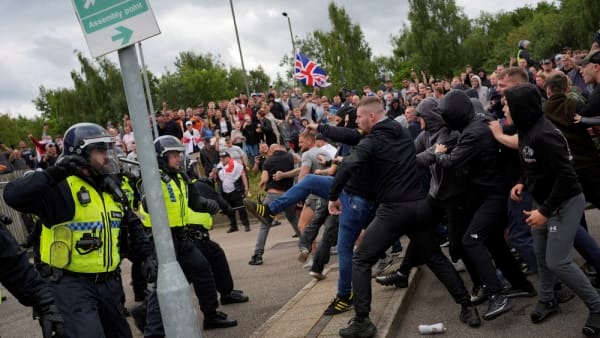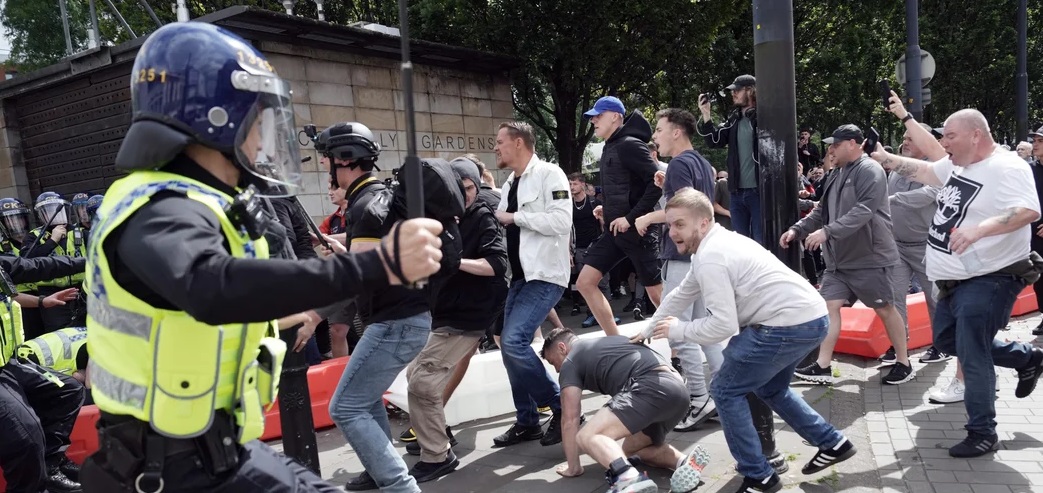 Photo: AP
Photo: AP
The idea of a civil war has traditionally referred to an internal conflict where one armed group seeks to wrestle power from the state. While some may brush this aside by suggesting a civil war is not something that the British do, we should not be so complacent, notes ‘UnHerd’.
Remember, after all, that alongside the American version, the English civil war between 1642-51 remains one of the most instructive. As a result of this very British version of civic slaughter, the modern theory of sovereignty appeared in Thomas Hobbes’s Leviathan. Not only did it put forward the now-familiar mantra that there is no politics without security and no security without the state, it also set in place the fundamental understanding — later picked up by Max Weber — that only the state can engage in legitimate violence.
“While some may brush this aside by suggesting a civil war is not something that the British do, we should not be so complacent.”
What marks a civil war from this perspective is a contesting of that very monopoly and the state’s right to use force for the preservation of order. That the police forces who appear on the front lines often become the first targets is not then incidental. But where is the line that needs to be crossed so that civil tensions become a war?
The UK political landscape is notably a world away from how it looked in the early Nineties, divided as we have become by all the social media tensions that, as recent days have shown, actually makes violence easier to provoke by non-uniformed and misinforming online generals. This has been matched by the Americanisation of our political system, where performativity — including the performativity of violence and outrage — has replaced substance and where the complex lines of identity and ethnicity have been reduced to crass caricatures based on neat categories of race, sex, gender and whatever other category we care to impose.
Unlike in Britain, the idea of a possible civil war there has been part of mainstream discussion in America for some time now. Indeed, what marked out Alex Garland’s compelling film Civil War was precisely its plausibility. Garland revealed one of the truisms of a civil war, where its experience is never universally shared. A civil war has never meant that every street is a battlefield. The violence is always concentrated. Witnessing the streets ablaze in Belfast at the weekend should remind us of this. That city, which for many impartial observers looked on the precipice of a civil war for a number of decades, was also liveable even as the ethnic divisions required the physical construction of walls. Belfast also shows how the lines of ethnic divisions are never static but take on new forms.
 Photo: AP
Photo: AP
A staple explanation in studies of global conflicts since the mid-Nineties has been the idea that poverty is the greatest single cause for violence. Indeed, the edict that underdevelopment was dangerous has been advanced by every single international organisation and humanitarian group tasked with mitigating conflict and violence. Certainly, areas of Britain are desperately poor at the moment. And they have been suffering from the fallouts of years of austerity, the impact of Brexit and the costs of the Covid lockdown. That the anger is spilling out from those areas is cause enough for deeper reflection. But we should not fall into the trap of reducing everything to a question of economy.
Thankfully, Britain is not an armed society, and its violence is mostly contained. But that shouldn’t mean that can’t change. Across the world, civil wars have been raging in the name of revitalised ethnic divisions, which have only required a single spark to set entire societies and nations ablaze. Britain is contending with these forces, and they could become much worse. It would be foolish to believe that we are too civilised to ever let that happen. The potential for civil war is written into the DNA of all ethnic conflicts — and, like a sleeping demon, once its fires are lit there’s no knowing where it will spread.
read more in our Telegram-channel https://t.me/The_International_Affairs

 10:31 10.08.2024 •
10:31 10.08.2024 •






















